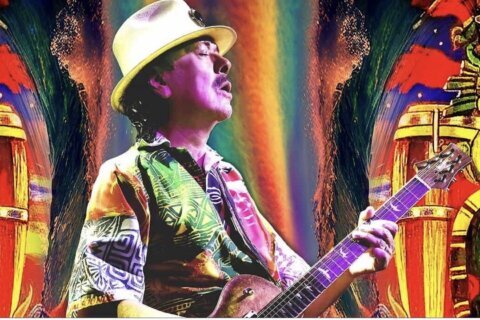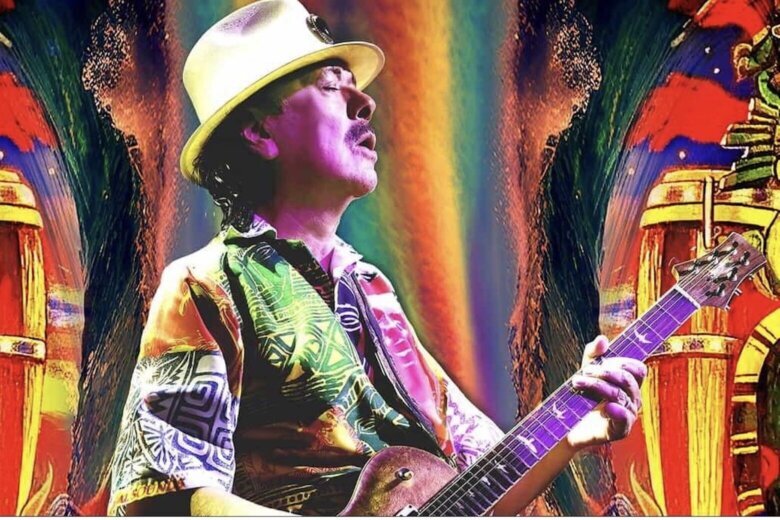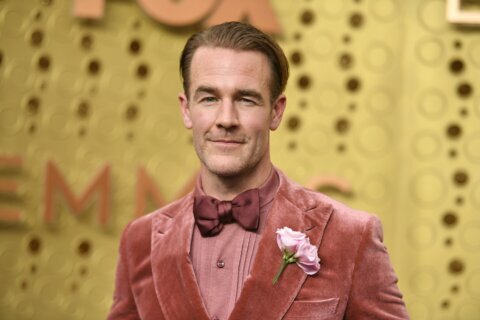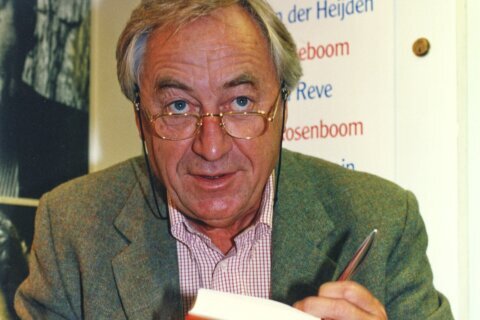Hear our full chat on my podcast “Beyond the Fame with Jason Fraley.”

He’s won a prolific 10 Grammy Awards — 13 if you count Latin Grammys — joining The Rolling Stones as the only two artists with Top 10 hits in every decade since the 1960s.
This Wednesday night, the legendary Carlos Santana rocks MGM National Harbor in Oxon Hill, Maryland.
“I’m very clear with specificity about honoring yesterday, today and tomorrow,” Santana told WTOP. “Tomorrow is improvising, yesterday is the songs that people grew up with, today is the songs from ‘Supernatural’ on, but the main thing is energy, power, grace, light and love. That’s what Santana is. It’s a celebration of your divinity.”
Born in Autlán de Navarro in Jalisco, Mexico in 1947, Santana’s family moved north to Tijuana before eventually crossing the border into the United States to settle in San Francisco where his father found steady work.
“All my life it seems like I’m a recipient of many blessings,” Santana said. “I feel like a child who crossed the border and someone was waiting for me with a big roll of tickets to ride all the rides at Disneyland and have any food I wanted, ice cream or candy. I really feel like that, man. Since I crossed the border, people have been really kind.”
How does a young boy grow up to become ranked among Rolling Stone magazine’s Top 20 Guitarists of All Time?
“I started out with the violin, then I picked up the bass, but people told me, ‘You play too many notes to be a bass player,’ so I picked up the guitar,” Santana said. “All of us grew up listening to Little Richard. He was the most electric guy before anybody Sly [Stone], Prince, Elton John or Liberace. Everyone from Jimi Hendrix to The Beatles learned [from him], including Bob Dylan. … To me, Little Richard, Chuck Berry and Bo Diddley are the architects.”
In 1966, Carlos formed the band Santana and soon released the band’s self-titled first album, “Santana” (1969). It featured hits like “Evil Ways” and “Soul Sacrifice,” which were performed in a now-famous set at Woodstock.
“It was because of [promoter] Bill Graham,” Santana said. “I have two people who opened gimungous [sic] doors for me: one is Bill Graham because of Woodstock and the other one is Clive Davis with ‘Supernatural.’ I love telling people, ‘You will have your own Bill Graham and your own Clive Davis in your life, God will make sure that you have that, just be open to it and be grateful. Those people do exist. They will come and open a big door for you.'”
His sophomore album, “Abraxas” (1970), was instantly iconic, including the sexy opening guitar of “Black Magic Woman” and the catchy cha-cha-cha of “Oye Como Va,” which roughly translates to “Hey, how’s it going?”
“‘Gregg and I were listening to a lot of Peter Green at the time,” Satana said. “We rehearsed it in a parking lot in Fresno … I immediately thought of Wes Montgomery, Otis Rush and B.B. King, that’s what you hear at the beginning of ‘Black Magic Woman.’ … Whenever I’m required to take a solo, I always go to my Rolodex and portfolio and see which musicians I can borrow their style here and there to create a patchwork.”
Indeed, Santana’s depth of knowledge in music history is paramount to his own creation. “Tony Bennett said if you take from one person it’s called stealing, but if you take from many it’s called research,” Santana said.
Carlos Santana had released 17 albums with the band and seven solo albums by the time he was inducted into the Rock & Roll Hall of Fame in 1998, but while most artists would have hung their hat there and called it a career, Santana did the exact opposite, releasing the biggest album of his entire career the following year.
“Supernatural” (1999) went straight to No. 1, winning nine Grammys to break the record of Michael Jackson’s “Thriller” for the most ever, still tied today with U2’s album “How to Dismantle an Atomic Bomb” (2004).
“People know about Michael, Gabriel and Raphael, but people don’t know about this archangel named Metatron,” Santana said. “In a seance meditation, Metatron told me, ‘You’re going to be more popular than ever, on the radio more than ever. All we ask from you is that every time you receive an award just say, ‘Kadosh, kadosh, kadosh Adonai Tz’vaot,’ which means ‘Holy, holy, holy is the Lord of Hosts.’ I kept my promise, they kept their promise and here we are. It’s all energy, man. If you don’t believe it, then you get nothing. If you believe it, you get a lot.”
The transcendent album fused the phenomenal energies of fellow artists like Lauryn Hill, Eric Clapton and Dave Matthews for smash-hit collaborations, including “Maria Maria” cowritten by Wyclef Jean of the Fugees.
“Thank God for Wyclef, he wrote the song just looking into my eyes,” Santana said. “My face became like a chart to read. He wrote a song ‘Maria, Maria’ just looking at my eyes and my face. It was pretty incredible to witness.”
The album’s most memorable hit was “Smooth” featuring Rob Thomas of Matchbox Twenty.
“By the time [‘Smooth’] landed in my lap between Rob Thomas, Itaal Shur and Clive Davis, there were nine to 12 instrumental people that put it together, so by the time it landed on my lap, all I had to do was close my eyes and play on it,” Santana said. “The way I remember, it was one take. We warmed up the band and this and that, but producer Matt Serletic was working a lot with Rob Thomas, so I’m just grateful, man.”
The album made Santana the first Latino to win Album of the Year, but he doesn’t believe in such boundaries.
“I don’t think like that, man,” Santana said. “I’m a multidimensional spirit that plays live. I don’t belong to this flag or that flag. I don’t have any emotional investment in patriotism or nations or countries — that stuff is corrupt corporations that I don’t follow. We are one family on this planet. If you and I got a chance to … go up in a space shuttle and see outside this planet, there’s no time up there, there’s no borders, no flags. We’re all one heart.”
Hear our full chat on my podcast “Beyond the Fame with Jason Fraley.”









